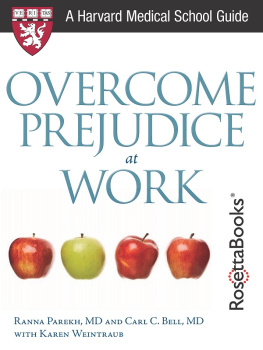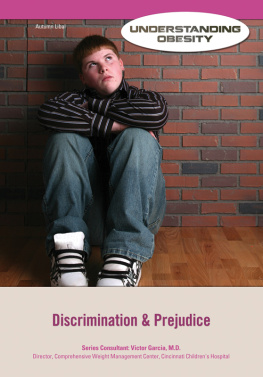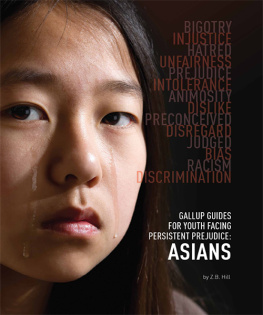Overcome Prejudice at Work
Ranna Parekh, MD, and Carl C. Bell, MD with Karen Weintraub
Copyright
Overcome Prejudice at Work
Copyright 2012 by Harvard University
Cover art to the electronic edition copyright 2012 by RosettaBooks, LLC.
All rights reserved. No part of this book may be used or reproduced in any form or by any electronic or mechanical means, including information storage and retrieval systems, without permission in writing from the publisher, except by a reviewer who may quote brief passages in a review.
Electronic edition published 2012 by RosettaBooks, LLC, New York.
ISBN ePub edition: 9780795332630
Contents
Dr. Ranna Parekh practices at Massachusetts General Hospital and McLean Hospital, and is an instructor of Psychiatry at Harvard Medical School. She also directs the Center for Diversity in the department of psychiatry at MGH.
Dr. Carl C. Bell is a professor of psychiatry and public health at the University of Illinois at Chicago, and president and CEO of Community Mental Health Council & Foundation, Inc., a Chicago-based, comprehensive community mental health clinic. During a 40-year career, Dr. Bell has gained a national and international reputation for his work on racism, stress, and resiliency.
Karen Weintraub is a science journalist who has written for The Boston Globe, USA Today and the BBC, among others. She also helped write The Autism Revolution, and Fast Minds: How to Thrive if You Have ADHD (Or Think You Might), also by Harvard Health Publications.
We felt compelled to write this e-book because we hear so often about people who are insulted, disrespected and prejudiced against in the workplace. These attacks may be too small for anyone except the recipient to notice. But they can still take a major toll over time. As psychiatrists who have devoted our lives to empowering people, we feel very strongly about the issues discussed in this book.
This book is organized as a series of tips to help readers understand and respond to insults at work and in their private lives.
Defending yourself is hard, often lonely, work. We hope that the advice we offer here will make the road a little easier for you, and help you to know that there are many other people like you, learning how to stay strong and feel good about themselves in the face of the injustices, indignities, and insults of everyday life.
Dr. Carl Bell was standing in line checking into a hotel, minding his own business when it happened. A white man cut in front of him and walked straight up to the front desk. Bell, a prominent Chicago psychiatrist, started to objectWhat, am I invisible?and then stopped himself.
As with many African-Americans, incidents like this happen to Dr. Bell with regularity. When they occur, he asks himself a series of quick, strategic questions: Is it worth an argument or should he let it slide? If he decides to fight, how should he do it? How will the other person respond? Will that response be something he can manage?
In this recent case, Dr. Bell decided not to confront the man whod cut him off. Hes tried that approach many times, and the offender always claims its an honest mistake and accuses the psychiatrist of being overly sensitive. Dr. Bell also stopped himself because he knew he was in a bad mood that day. I was afraid that if I said something, he might turn around and say something stupid to me. In the mood he was in, Dr. Bell knew such a situation could turn ugly fast. He decided it wasnt worth a major scene.
The term microaggression describes incidents like Dr. Bells: an act that feels hostile to the person on the receiving end, but is often unconscious or dismissed by the perpetrator. People who are minorities because of physical characteristics such as gender, skin color or age are more often subjected to microaggressions, but most of us have been microaggressed at some point. And most of have committed microaggressions ourselves. Each individual incident is minor on the surface, but doesnt feel that way to the recipient, particularly if the aggressor is a person of authority, like a boss, or if it happens at work.
Often, microaggressions are directed at superficial qualities, like the way we look. The term was defined by Dr. Chester M. Pierce in the 1970s to describe the continuing stain of racism, albeit a more subtle form than during the Jim Crow era. Black Americans, he says, were often put down with subtle, stunning, often automatic, and nonverbal exchanges. A single microaggression might seem harmless, but the cumulative burden of a lifetime of microaggressions can contribute to physical illness and destroy self-confidence.
Dr. Bell, dressed impeccably, was once confused with an airport porter. Another time, when he arrived at a meeting hall to give a speech, the hostess assumed he was a member of the band. Would those people have made such insulting mistakes if Dr. Bell were white?
Such racism, as well as sexism, ageism, classism and other isms are all microaggressions. More examples of these toxic, negative interactions include:
- An employer who requires workers to use e-mail or new technologies may be putting their older employees at an unfair disadvantage.
- Men who post sexually explicit images of women on a workplace wall are setting women up to be treated differently than men.
- Companies that are more supportive of a mother leaving early to pick up a child than a father are being discriminatory; as are ones that assume a childless worker can put in more hours than a parent.
- Shopkeepers who ignore poorly dressed customers in favor of well-dressed ones are showing a bias that could hurt their bottom line.
- Coworkers who skip an obese colleague when inviting others to lunch are committing a microaggression.
Perhaps none of these people meant to insult the others. Microaggressions are usually automatic; the visible signs of an otherwise undisclosedand often unrecognizedprejudice. Because of this unconsciousness, the people who commit microaggressions generally view their actions as innocent or innocuous, and dont understand why the person they microaggressed gets upset.
The recipient often feels victimized a second time when the perpetrator denies that anything happened. Comments like Youre so sensitive! or It was an honest mistake can deny and invalidate the feelings of the recipient, making them feel even worse about themselves.
These insults are not limited to human encounters. They can be physical spaces as well, such as stores where the racks are placed too close together to fit a wheelchair, poorly lit spaces that are difficult for older people to navigate, or the corridors of corporate offices or vaunted universities filled with portraits of older, white men.
Dr. Pierce, a professor emeritus of psychiatry at Harvard Medical School and Massachusetts General Hospital, where he was the first African-American full professor, says he came up with the idea of microaggressions after a plane flight, when he was assigned to a middle seat. A white woman came on the plane, assigned to sit on the aisle next to him. He noticed that she looked visibly upset. Then, the man across the aisle, who had also noticed her distress and assumed it was because she was assigned to sit next to a black man, offered to switch with her. She gratefully accepted and the man sat down next to Dr. Pierce and tried to make small talk.
Dr. Pierce wasnt in the mood to be cordial after that, but he didnt confront the man, either. It wasnt something I could raise sand about, because it was micro, Dr. Pierce said recently. Plus, the man who was now his seatmate felt he had just done a generous thing. He was unaware of or unconcerned about having slighted Dr. Pierce, only conscious that he had helped make a lady more comfortable. Whats not innocuous about a man offering to make a lady more comfortable? How can you argue with his intentions? Dr. Pierce said in remembering the incident.












